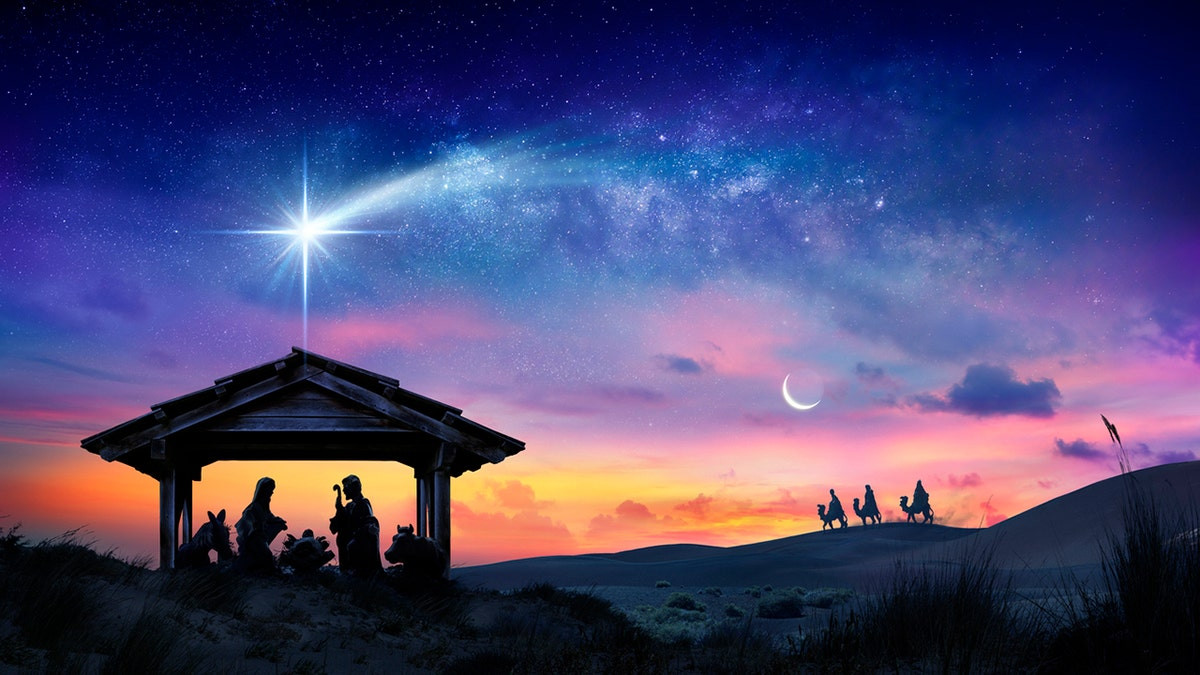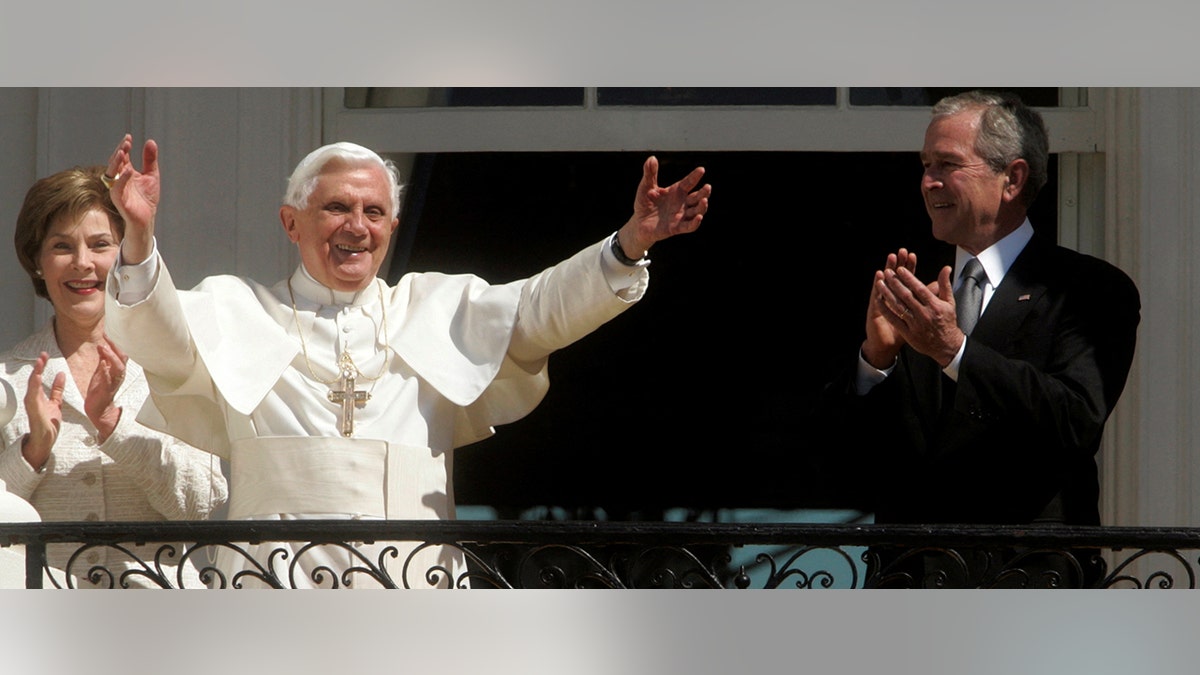
NEWYou can now listen to Fox News articles!
St. John’s account of Christmas is austere in the extreme. It comes down to one line: “And the Word was made flesh and dwelt among us.” Not one mention of creche, Mary and Joseph, shepherds, or Wise Men.
Just that simple and rather abstract statement. But that line, and more importantly, the event that it describes, has had massive civilizational impact.
What precisely is the “Word” that the evangelist is referencing? John tells us in the opening verse of his Gospel: “In the beginning was the Word, and the Word was with God, and the Word was God.”

What became flesh in the child of Bethlehem was the mind of the Creator, the Pattern that gave rise to all the patterns discernible in the universe. (iStock)
What became flesh in the child of Bethlehem was the mind of the Creator, the Pattern that gave rise to all the patterns discernible in the universe. That the world is stamped, in every nook and cranny, by intelligibility is a function of this metaphysical truth, that “in the beginning” was not chaos or arbitrariness, but precisely word, logic, meaning.
THIS CHRISTMAS, I KEEP THINKING ABOUT FAMILY, FRIENDS IN WESTERN NC. AMERICA SHOULD, TOO
Every science depends upon this mystical assumption of universal intelligibility, which in turn is a function of the very metaphysics that St. John describes. It is, accordingly, no accident that the modern physical sciences developed in the context of Christian universities where the doctrine of creation through the Word was consistently taught.
In 1960, the theoretical physicist Eugene Wigner wrote an article with the intriguing title, “The Unreasonable Effectiveness of Mathematics in the Physical Sciences.” He observed that modern physics had uncovered a world that can be described adequately only through the application of complex mathematics. But he wondered why this should be the case. Why should nature be marked by exquisitely patterned intelligibility and not simply by chaos?
AS PEPPERDINE PRESIDENT, WE LEARNED THROUGH HARDSHIP CHRIST BRINGS LIGHT TO END THE DARKNESS
In the course of his brief article, he doesn’t provide a definitive answer, but he uses the term “miracle” numerous times to express the unlikeliness of this state of affairs. Of course, those trained to see the world through biblical eyes would not be the least surprised, for they would know that matter is marked by math because the maker of matter is a mathematician: “In the beginning was the Word.”
In his badly misunderstood and much maligned Regensburg Address of 2006, Pope Benedict XVI insisted that the primacy the Gospel gives to Logos opens the door to a dialogue between faith and reason and indeed between Christianity and the other great religions.
If Christ is the incarnation of the divine Logos, then a bridge can be constructed between Christ and any other expression of logos, be it spiritual, scientific, or cultural. If Word is the fundamental reality, then something like constructive argument between intellectual opponents is possible. How important it is, therefore, that “in the beginning,” there was Word and not Will.

Pope Benedict XVI waves from a balcony at the White House after being welcomed to the United States by President George W. Bush and first lady Laura Bush, April 16, 2008. (Reuters/Larry Downing/File)
WE HAVE A LOT TO LEARN ABOUT HOPE FROM CHIMNEY ROCK, NC THIS CHRISTMAS
At the heart of Pope Benedict’s discourse is a criticism of voluntarism, the philosophy that indeed gives primacy to will over mind. When this view is embraced, arbitrariness reigns supreme and argument must give way to displays of power and ultimately to violence. Can anyone doubt that this voluntaristic attitude is ascendant in our culture today?
Objective truth, which would provide a basis for shared conviction, surrenders to the all-conquering freedom of each individual’s will, conducing inevitably to finally unresolvable conflict.
Now we must remember the distinctive Christmas message conveyed by St. John. The Word is indeed with God from the beginning, but this same Word became flesh, and it did so in a very particular way.
CHRISTMAS 2024: JESUS IS WHAT HAPPENS NEXT
The primal Logos, the mind of the Creator, the eternal ground of intelligibility manifested itself as a baby too weak to raise his own head, an infant wrapped in swaddling clothes and lying in a manger. This means that the Pattern of patterns, that which shines through any and all expressions of rationality in the cosmos, is self-emptying love.
On a voluntaristic reading, the overarching pattern of reality is power and self-assertion, but according to the vision of reality communicated by St. John’s Christmas Gospel, that is dangerous nonsense. In point of fact, the template according to which the stars and planets and galaxies were designed is a love that gives itself away.
I fully realize that many readers of these reflections might wonder how all of this squares with the brutal reality of suffering that seems to surround us on every side. How could Logos and love be the ultimate realities in a world so darkened by wickedness?
CLICK HERE FOR MORE FOX NEWS OPINION
But evil is always a privation of the good, a lack of a perfection that ought to be there. Hence, it is parasitic upon the good, inevitably less than the good that it has compromised – which is why its pretention to be a fundamental principle of reality should always be mocked.
It is why St. Paul could say, “Where sin abounds, grace abounds the more.” And it is also why St. John, who was never blind to the presence of evil, could include in his announcement of the Incarnation this assurance: “The light shines in the darkness, and the darkness did not overcome it.”



